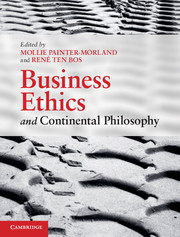Book contents
- Frontmatter
- Contents
- Figures
- Boxes
- Contributors
- Foreword
- Acknowledgements
- Introduction: critical crossings
- 1 Agency in corporations
- 2 Stakeholder theory
- 3 Organizational culture
- 4 Enron narrative
- 5 Moral decision-making
- 6 Organizational justice
- 7 Reward, incentive, and compensation
- 8 Leadership
- 9 Whistle-blowing
- 10 Marketing, bad faith, and responsibility
- 11 Corporate social responsibility
- 12 Corporate responsibility standards
- 13 Sustainability
- 14 Globalization
- Glossary
- Name index
- Subject index
- References
11 - Corporate social responsibility
Published online by Cambridge University Press: 05 June 2012
- Frontmatter
- Contents
- Figures
- Boxes
- Contributors
- Foreword
- Acknowledgements
- Introduction: critical crossings
- 1 Agency in corporations
- 2 Stakeholder theory
- 3 Organizational culture
- 4 Enron narrative
- 5 Moral decision-making
- 6 Organizational justice
- 7 Reward, incentive, and compensation
- 8 Leadership
- 9 Whistle-blowing
- 10 Marketing, bad faith, and responsibility
- 11 Corporate social responsibility
- 12 Corporate responsibility standards
- 13 Sustainability
- 14 Globalization
- Glossary
- Name index
- Subject index
- References
Summary
Goals of this chapter
After studying this chapter you will be able to:
describe how the meaning of corporate social responsibility (CSR) has been historically contested;
appreciate the productive role which questioning can play within the CSR debate;
illustrate how Martin Heidegger's work delineates just such a manner of destructive questioning;
offer an understanding of how established research traditions, in this case the tradition that questions CSR, can have the unintended effect of concealing the very thing they strive to reveal;
understand how complex discussions about responsibility are, both in theory and in practice.
Introduction
The acronym ‘CSR’ conventionally refers to corporate representatives’ voluntary integration of social and environmental concerns into their business decisions. There is perhaps no other acronym that has become more prevalent within contemporary business ethics debates. Not a day goes by, it seems, where corporations and/or their representatives aren't routinely commended and/or condemned for demonstrating either too much, or else too little, CSR. The discussion over the appropriate level of CSR isn't only topical, of course: it is also an inherently controversial discussion defined by very little by way of consensus. And yet, for all of its inherent topicality and controversy, the nature of CSR is by no means something initially easy to grasp, despite its having been defined almost as many times as it has been mentioned. On the contrary, as will be demonstrated within this chapter, the very fact that CSR is both topical and controversial is a fact that makes its very meaning ever more fleeting and enigmatic.
- Type
- Chapter
- Information
- Business Ethics and Continental Philosophy , pp. 242 - 262Publisher: Cambridge University PressPrint publication year: 2011
References
- 3
- Cited by



